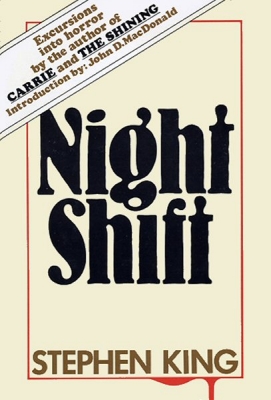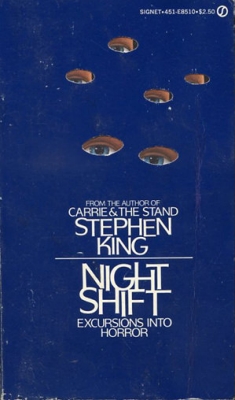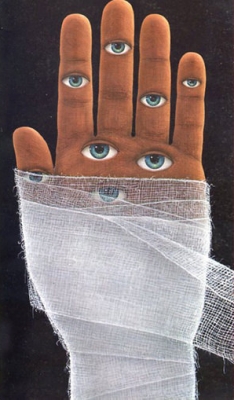The Golden Age of Science Fiction: Night Shift, by Stephen King
The Balrog Award, often referred to as the coveted Balrog Award, was created by Jonathan Bacon and first conceived in issue 10/11 of his Fantasy Crossroads fanzine in 1977 and actually announced in the final issue, where he also proposed the Smitty Awards for fantasy poetry. The awards were presented for the first time at Fool-Con II at the Johnson County Community College in Overland Park, Kansas on April 1, 1979. The awards were never taken particularly seriously, even by those who won the award. The final awards were presented in 1985. The Balrog Award for Collection/Anthology was presented each year that the awards were active.
The stories in Night Shift cover a period from the late 1960s through 1976, a time when King was maturing as an author and finding his own voice as well as becoming a best selling author. Many of the stones in Night Shift would form the basis of novels and films, notably “Jerusalem’s Lot,” “Lawnmower Man,” “children of the corn,” and “Graveyard Shift.”
King opens The collection with “Jerusalem’s Lot,” which was a previously unpublished version of his novel Salem’s Lot. Although King comments that the story has a basis in Bram Stoker’s Dracula, it’s even more obvious antecedents are the works of H. P. Lovecraft. Even as King tries to emulate Lovecraft’s style, he never quite captures it, making the story of The Boone family in Maine feel overwritten rather than chilling. By the time King gets to “The Man Who Loves Flowers,” he has discovered that a more naturalistic world provides the opportunity for much more chilling horror. The fantastic creatures of “Jerusalem’s Lot” could only happen in fiction or dreams, but the sociopathic horror of kings’ protagonist in he later story could be anyone the reader meets on the street.
Some of the stories in the book which also demonstrate the transition include “Lawnmower Man,” which includes a man who isn’t quite human, but the fantastic elements are more limited, “I Know What You Need,” about a boy whose infatuation with a girl leads him to extreme measures, and “I Am the Doorway,” a rather horrific alien invasion story which is also a tale of possession. Lovecraft’s influence does appear in several of the stories in the book, although usually in a more minimalistic way than in “Jerusalem’s Lot.”
By the time Night Shift was published, King had already established himself as one of the premiere horror authors. Original readers would have been a mixture of those who wanted to discover King’s roots and those who couldn’t wait for him to release his next bestselling novel.
King’s Night Shift was up against a slew of other collections and anthologies, including Alchemy and Academe, by Anne McCaffrey, Amazons!, edited by Jessica Amanda Salmonson, The Book of Munn, by H. Warner Munn, Champions of the Road, by Tanith Lee, Fireflood and Other Stories, by Vonda N. McIntyre, Green Magic: The Fantasy Realms of Jack Vance, Heroic Fantasy, edited by Gerald Page & Hank Reinhardt, The Howard Collector, edited by Glenn Lord, The Princess of All Lands, by Russell Kirk, Shadows 2, edited by Charles L. Grant, Swords Against Darkness IV and Swords Against Darkness V, both edited by andrew j. offutt, Thieves’ World, edited by Robert Asprin, Webs of Time, by Joseph Payne Brennan, Whispers II, edited by Stuart David Schiff, and The Year’s Finest Fantasy, Volume 2, edited by Terry Carr.
While Night Shift may have been read by more people over the years, it is arguable that of the works nominated for the award, Thieves’ World had the largest impact on the field.
 Steven H Silver is a sixteen-time Hugo Award nominee and was the publisher of the Hugo-nominated fanzine Argentus as well as the editor and publisher of ISFiC Press for 8 years. He has also edited books for DAW and NESFA Press. He began publishing short fiction in 2008 and his most recently published story is “Webinar: Web Sites” in The Tangled Web. Steven has chaired the first Midwest Construction, Windycon three times, and the SFWA Nebula Conference 6 times, as well as serving as the Event Coordinator for SFWA. He was programming chair for Chicon 2000 and Vice Chair of Chicon 7.
Steven H Silver is a sixteen-time Hugo Award nominee and was the publisher of the Hugo-nominated fanzine Argentus as well as the editor and publisher of ISFiC Press for 8 years. He has also edited books for DAW and NESFA Press. He began publishing short fiction in 2008 and his most recently published story is “Webinar: Web Sites” in The Tangled Web. Steven has chaired the first Midwest Construction, Windycon three times, and the SFWA Nebula Conference 6 times, as well as serving as the Event Coordinator for SFWA. He was programming chair for Chicon 2000 and Vice Chair of Chicon 7.



“Night Shift” was the first Hardback book that I bought with money that I had earned by working. For my tastes it’s one of the best single author collections to ever see print. I reread from cover to cover every few years.
I’m not a big King fan, but I really enjoy this collection. And I think “Jerusalem’s Lot” is pretty darn chilling—enough that it made me track down Salem’s Lot and read it (still one of my fav King novels). I find this novel far superior to many of his later works, ironically because it is not overwritten, though I’m sure your analysis is probably correct on the short story.
Night Shift wasn’t the FIRST King I read (that would’ve been The Dead Zone), but it was probably second or third. As I recall, when I was first getting turned on to King (in late junior high/early high school, by a friend who lent me The Dead Zone) there was a period when it was almost impossible to lay hands on his books in the library, unless you got really, really lucky, so I’d just grab whatever came to hand.
This collection is definitely early work, but it does have a lot of stories that still stick with me to this day.
Love this collection. You get his forward which was later expanded into Danse Macabre.
-Night Surf, which hints at the the future awesomeness that will be The Stand
-Gray Matter, which is a personal favorite of mine in this collection, sort of The Color Out of Space only with beer.
-Most of the stories that ended up in the anthology Cat’s Eye.
Such an awesome collection.